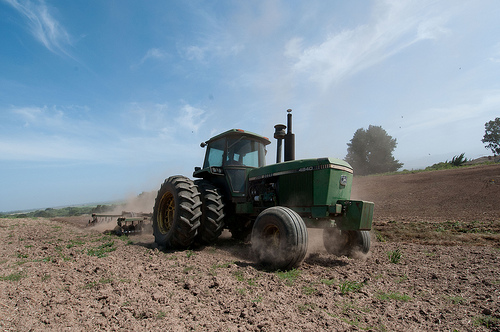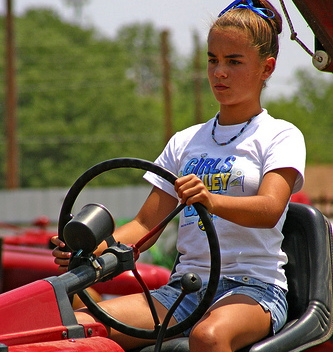
The Beginning Farmer and Rancher Opportunity Act is one of two bills sustainable ag advocates will be rallying around this spring. (Photo by fieldsbh.)
Now that we’re beyond all the intrigue and behind-closed-doors shenanigans of the failed Secret Farm Bill, the good food movement is tasked with something even more daunting: staying awake and engaged as the 2012 Farm Bill moves through a more traditional process of hearings, committees, and amendments. I have my party hat on — do you?
The clock is ticking
Because we’re in an election year, the bill would essentially have to be ready to go by the beginning of this summer for it to pass before the 2008 bill expires in September. And while Tom Laskawy and others think that’s unlikely, it’s not impossible, either. In a recent, super-in-depth rundown of the logistical and political factors effecting the process, the National Sustainable Agriculture Coalition (NSAC) wrote:
… The Food, Energy, and Conservation Act of 2008 was, in fact, passed in the presidential election year of 2008. But unlike the current situation, both the House and the Senate had already passed their versions of a farm bill in 2007. The work in 2008 was focused on reconciling the differences in the two bills through a conference committee and then passing the compromise.
Nonetheless, five Democrats on the Senate Agriculture Committee are up for re-election in 2012 (including chairwoman and Michigan Sen. Debbie Stabenow). And while none are in a tight race yet, “if that changes, then the pressure to deliver a farm bill in the Senate could increase,” the NSAC briefing adds.
For now, it’s clear that the Senate committee is moving forward — thanks in part to pressure from big commodity farmers (who are anxious to see a bill come together). In fact, just last week, Stabenow announced the first round of Farm Bill hearings, set to begin on Feb. 15.
Worth fighting for: Local food and new farmers
If a bill does pass this year, it will likely continue to guarantee huge piles of cash for big commodity farmers (just in a slightly different form than in years previous). And, as the Environmental Working Group is fond of pointing out, many of the actual subsidy checks go to families of wealthy farm owners in Manhattan, Miami, and Seattle. But there are two potential silver linings in the 2012 Farm Bill. The Beginning Farmer and Rancher Opportunity Act is crucial for diversifying the scope of farming in this country — and inviting more young, sustainability-focused folks into the fray. As the bill’s name implies, it would provide loans, training, and other forms of support for new and beginning farmers (including returning veterans) at a time when the average age of the American farmer hovers around 56.
The Local Farms, Food, and Jobs Act of 2011 is equally worth rallying around. It would help small farmers and farmers market programs, help link farms to schools and other institutions, and provide the distribution help necessary for the local food movement to grow. Over 200 organizations around the country have supported the bill so far.
California steps it up
One place where we’re likely to see a big push for both of the above “marker bills” is in California, a state that is slim on commodity agriculture and therefore often less represented in the Farm Bill discussion. But Steve Shwartz, who manages NSAC’s new California caucus (a group made up of 11 organizations including Roots of Change, Community Alliance with Family Farmers, California Certified Organic Farmers, and the Organic Farming Research Foundation), says this year might be different.
“This is our best shot to get some great language in the version coming out of the Senate. So that’s what we’re working hard on right now,” says Schwartz, who says he gathered 400 targeted postcards at last week’s EcoFarm conference. He says the key is to get the handful of California lawmakers on Senate and House agriculture committees interested in championing efforts that will impact non-commodity crops (i.e. fruits, nuts, and vegetables, or everything that grows outside the middle of the country), and he believes the beginning farmer and local foods bills are the best way to do it. “We really want to make sure Californians’ voices are heard,” says Schwartz.
Jeanne Merrill of the California Climate and Agriculture network, another group in the committee, wrote recently on the organization’s website:
Together, the two bills would create new local food market opportunities for farmers and consumers, improve organic farm programs, including organic crop insurance, and ease access to land and capital for beginning farmers and ranchers — all key issues for California agriculture.
So far, Schwartz says, the local food bill has received 66 co-sponsors in the House and nine in the Senate. “Momentum is building,” he adds. “We want to see more bipartisan support. And we think that having a lot of grassroots pressure and calls can make a real impact.”
Take action: Speak up for local farmers, local food, and economic development! (Or if you’re a California resident, take action here)



